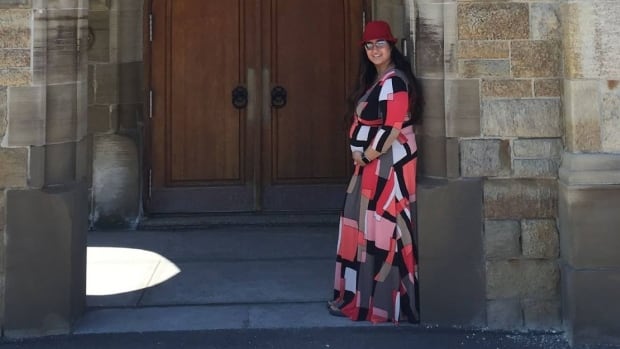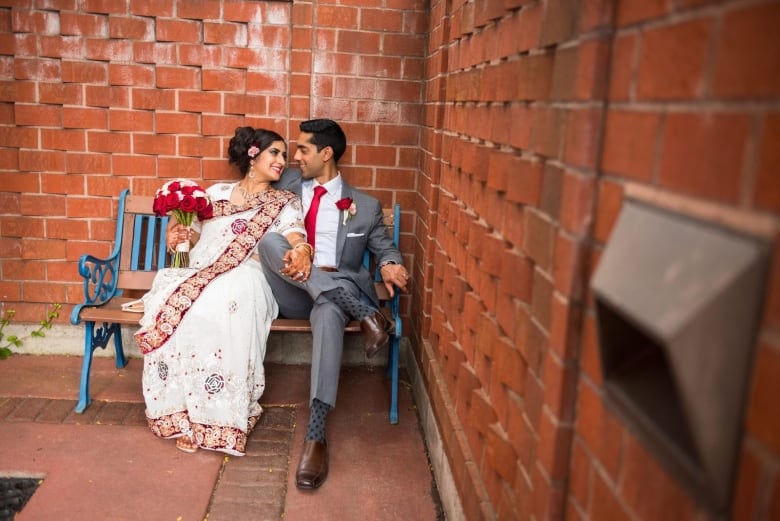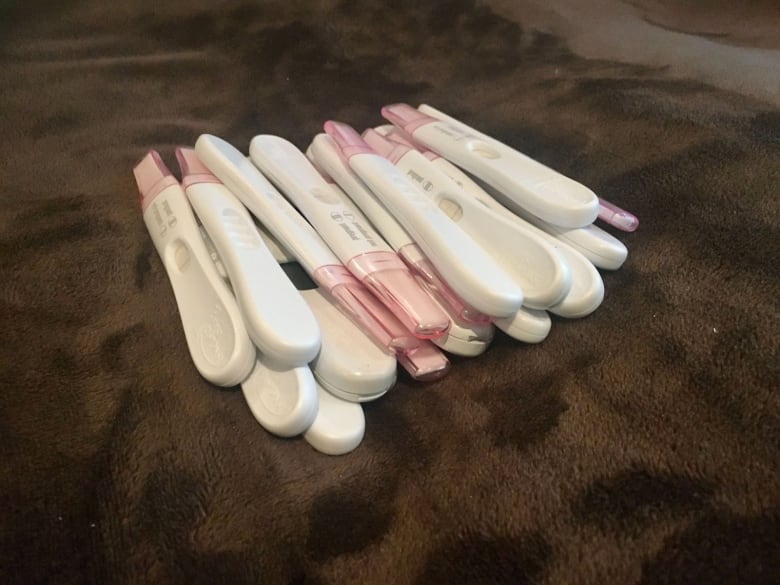
This First Person article is written by Fariya Walji, a lawyer and strategic director in Toronto. For more information about CBC’s First Person stories, please see the FAQ.
I’m lying on a moving gurney, staring up as bright hospital lights burn my eyes. A nurse that I have never met crouches over me, her hand inside me as we careen into the operating room. I introduce myself to her, joking that I don’t usually let people get so close without knowing their names. She laughs, but I see the apprehension in her eyes. A lump lodges in my throat.
There is no time to wait for the anesthetics to take full effect. Someone pokes my stomach with a sharp object asking where it hurts least, and I know they’re desperate to start cutting.
This is it, I tell myself. My heart is beating loudly; it sounds like waves pounding in my ears. My throat is dry, a sour taste from the drugs resting at the back of my tongue. I am afraid, and tears well up in the corners of my eyes.

My husband rushes to my side and slips his hand into mine, his deep voice steadying me just as he has many times over the past seven months of our tumultuous pregnancy. I picture his face, the way it was glowing the day we were married.
I think about how he closes his eyes when he laughs deeply. The tightness in my chest eases a little. I imagine my husband holding a baby in his arms, a smile radiating across his face. I see her walking beside him, holding his hand, growing up kind and smart and happy. Suddenly, I am not so afraid. I am not afraid to die, so my daughter will live.
I take a deep breath, and say, “start cutting.”
Nine years ago, children were far from my mind. I was a law school graduate, reeling from years spent pouring over small print in thick textbooks. In quiet moments of existentialism, I queried how I would make the world a better place. The future was full of opportunity and children did not yet fit into my plans as a lawyer.
My husband waited patiently for me to discover the world before gently broaching the topic of children. I had an inkling that getting pregnant would be difficult, and a barrage of visits to the doctor and medical tests cemented my worries. “When should we have children?” became, “can we have children?”
In between the self-administered hormone injections and incessant blood work that left scarring on my arms, my feelings of inadequacy ballooned. After a lot of time, pain, money and exhaustion, we got pregnant. I didn’t believe it at first, refusing to celebrate, nervously peeing on pregnancy tests every morning for several days.

The subsequent months were a roller coaster — high moments building a crib and purchasing clothes; low moments of bleeding and hospital stays due to complications with the pregnancy. I was anxious about every ultrasound. Against the odds, our daughter held on, her little watery heartbeat pumping and her hands waving on the screen.
These days, I replay every moment of the day she was born like a cinematic reel on fast-forward.
Forward. Pause.
It was three months before the due date. I’m eating waffles for breakfast after kissing my husband goodbye as he leaves for work.
Forward. Pause.
I rush to the hospital with back pain, unsure if I am overreacting. Is it Braxton Hicks? I approach the front desk bewildered, saying, “I think I am in labour.”
Forward. Pause.
I am lying on the hospital bed, staring into the brown eyes of the neonatologist, straining to hear his voice. In between the contractions shuddering violently through my body, he tells me everything will be OK and my child has a 95 percent chance of surviving.
Forward. Pause.
After frantic texting back and forth, my husband finally bursts into the hospital room, his eyes filled with worry. I smile, relieved we are together.
Forward. Pause.
Despite the medications to slow the contractions, I am fully dilated and ready to push.
Blood gushes out. The cord prolapses; we need an emergency Cesarean section. We rush to the operating room.
Forward. Pause.
My body is cut open, organs shuffled as the doctor frantically searches to get the baby out.
Forward. Pause.
My daughter is born and whisked away, my husband racing after her as I lay helplessly on the operating table, trying to stay conscious.
Forward. Pause.
I am back in my hospital room. My husband tells me he has seen our little girl, and she is beautiful and strong like her mother. The doctors are taking good care of her.
Forward. Pause.
The neonatologist suddenly runs in, whips back the curtain and says, “I am so sorry, but I don’t think she is going to make it.” His words slap me across the face. My husband rushes out of the room to hold her as she takes her last breaths. I sit alone in shock. My family arrives at the hospital to celebrate and I begin to cry.
Forward. Pause.
They bring me a little bundle in a yellow knit blanket. She is so small. Her fingers are wrinkled. Her eyes are almost closed, a little sliver betraying that she has deep chestnut eyes like her father. I hold her desperately, searching for the heart that beat within mine every day.
Forward. Pause.
Her body is cold. I hand her back to the nurse, unable to comprehend what I am giving away.
Forward. Pause.
After hearing the sweet cries of other babies in the maternity ward, we leave, unwilling to spend one more night in recovery as our daughter lies in the morgue.
We go home to an empty nursery — a mausoleum of pain. My husband and I are alone. My body is exhausted. My heart is embroiled in pain and guilt.
Forward. Pause.
We’re outside on an unusually warm day in May, surrounded by family. My husband steps out of the black car carrying a tiny coffin, his shoulders weighed down in grief. I watch the person I love gently carry our daughter away from me, and into the sunshine.
We leave the freshly-dug gravesite and hold each other up, unwilling to let the other yield to the overwhelming grief and darkness.
Forward. Pause.
Months pass. I lean on my family. I heal and break in a tortuous cycle. In a day, small reminders bring tears to my eyes and hope in my heart. I learn to accept that a part of me has died with my child and that I am forever changed.
Can you be a parent if you no longer have a child? Can you love someone who you have never met? She was mischievous and feisty and strong. She made me a better woman and a stronger person. She gave us hope.
And she made me a mother. We love them before they are born and after they are gone. We love them forever.
In 2022, four years later, Fariya and Sameer welcomed two baby girls into their family. Read Sameer’s column about the family’s pregnancy journey.
Do you have a compelling personal story that can bring understanding or help others? We want to hear from you. Here’s more info on how to pitch to us.